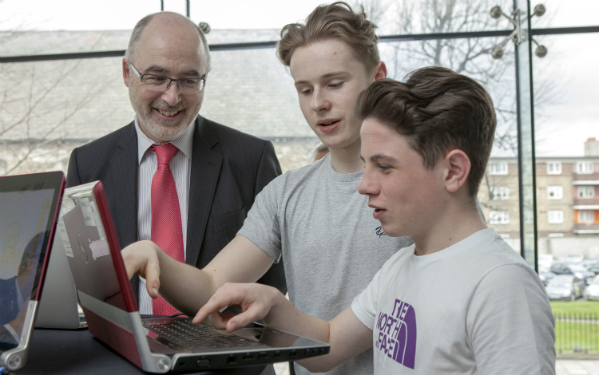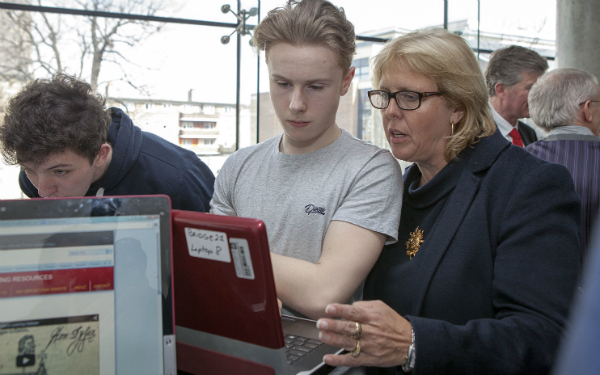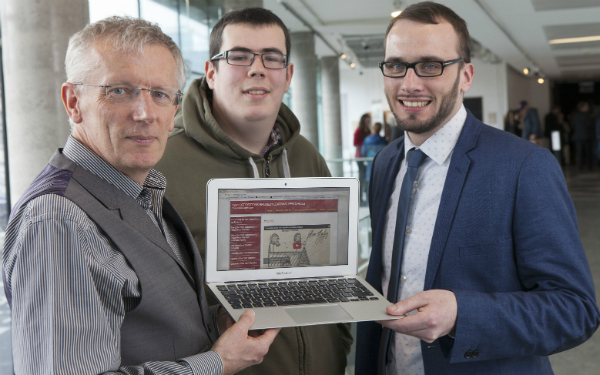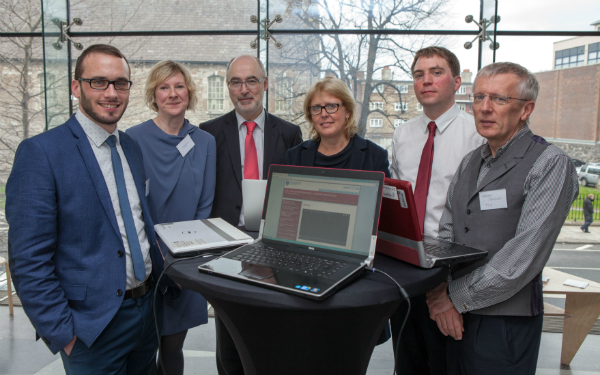New Online History Resource ‘1641 Depositions Bridge21 Website’ for Second Level Students
Posted on: 02 April 2015
A new online history resource ‘1641 Depositions Bridge21 Website’ for second level students has been created by a team of historians in collaboration with educational innovators Bridge 21 at Trinity College Dublin. The Secretary General of the Department of Education and Skills, Seán Ó Foghlú, launched the website that contains 21st century learning activities around the 1641 Depositions, at a seminar on technology and innovative teaching and history, this week.
The 1641 Depositions are one of the most controversial sources in modern Irish history. They comprise a collection of 8,000 witness statements taken during the 1640s and 1650s – a period of extreme violence throughout the island of Ireland. They provide evidence of the hotly contested massacre of Irish Protestants during the outbreak of the Irish rebellion of 1641. The website is designed to bring the 1641 Depositions into the classroom as digital resources to be read in their original form.

“This new exciting digital resource based on the 1641 depositions has the potential to stimulate teachers’ and students’ interest in, and engagement with, the complex but enthralling topic of 17th century Ireland. The effective integration of ICT into teaching, learning and assessment is one of the objectives of the Department of Education and Skills. This objective is being progressed through the development of a new Digital Strategy for schools, and the recently published Digital Roadmap for the higher education sector,” said the Secretary General of the Department of Education and Skills, Seán Ó Foghlú.
“A pervading discourse in educational circles is the need to move towards 21st century models of teaching and learning in order to promote deep engagement with curriculum content and to foster the development of 21st century skills in students. The Bridge21 project at Trinity has developed a particular model of 21st century teaching and learning and is working with a network of schools around the country to adapt this model for use in the mainstream classroom,” said Professor Brendan Tangney, the Academic Director of Bridge 21.

“The future of teaching history in Irish schools is a topic of some debate. Information Technology is opening up new ways in which students can engage with history. Not only are primary historical resources now directly accessible such as the censuses, but technology enables students to directly engage in the processes of searching for original historical information, synthesising and critically reviewing sources and then presenting findings and arguments backed up by evidence. Thinking and acting like a historian is important not only for those who wish to pursue the study of history in its own right. The skills of searching and critically reviewing are the very same ones which are seen to be of central importance in the emerging Knowledge Economy,” added Professor of Modern History, Jane Ohlmeyer.
In addition to the launch of the online history resource, a seminar, hosted by the School of Histories & Humanities in Trinity College Dublin and Trinity’s Centre for Research in IT in Education (a collaboration between the School of Education and the School of Computer Science & Statistics), showcased examples of highly innovative projects which demonstrate how technology can be used to allow students and the wider public to engage with history.

The keynote address was by Luke Smith who created the www.livesofthefirstworldwar.org for the Imperial War Museums, in London, Trinity’s Associate Dean of Online Education, Dr Tim Savage discussed Trinity’s hugely successful ‘Irish Lives in War and Revolution’ MOOC (massive open online community) and Dr Owen Conlan described how developments in adaptive and interactive computing technology can be used to promote engagement with digital cultural heritage collections. The seminar concluded with a panel discussion on “How technology changes the way we can engage with history and heritage”.
The creation of this site was funded by a grant from the Department of Foreign Affairs Reconciliation Fund. Professor Jane Ohlmeyer was the principal investigator for this grant. Dr Eamon Darcy and Dr Danielle O’Donovan collaborated and developed the online resource. Bridge 21 at Trinity College Dublin promotes team-based and individual research through technology-mediated resources that will develop the critical thinking and analytical skills of students, and help them to fulfill their potential.

Links:
- 1641 Depositions Bridge21 Learning Resources – http://1641.tcd.ie/
- 1641 Website – http://1641.tcd.ie/
- Bridge21 – www.bridge21.ie
